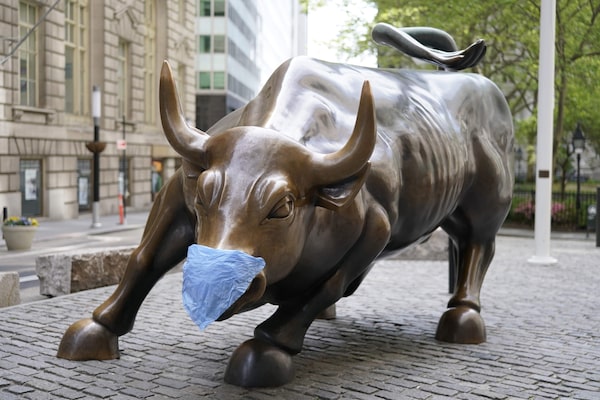
Technology shares have been joined in the latest leg of the rally by cyclical stocks, albeit fitfully.TIMOTHY A. CLARY/AFP/Getty Images
It was a small gain but a big milestone.
When U.S. stocks closed fractionally higher on Tuesday, they set a record and capped a powerful, if uneven, rally fuelled by central bank stimulus – one that has wiped away all the market losses from the COVID-19 pandemic.
The day was symbolic of the rally: more stocks fell than rose, but a few big tech companies pushed the S&P 500 over the line. Amazon.com Inc. (AMZN-Q) was up more than 4 per cent on the day; Google’s parent company, Alphabet Inc. (GOOGL-Q), was up 2.7 per cent.
Add in Apple Inc. (AAPL-Q), Microsoft Corp. (MSFT-Q) and Facebook Inc. (FB-Q) and the five largest stocks in the S&P 500 together account for a quarter of the rally since the crescendo of selling in late March.
The quintet now represents more than a fifth of the index, the biggest weighting for the top five since at least 1980.
They have been joined in the latest leg of the rally by cyclical stocks, albeit fitfully. Investors have become more willing to place bets on a sustained rebound in business activity, amid hopes the pandemic could be peaking in the U.S.
Yet, a significant majority of S&P 500 members are still below their levels when the market last peaked on Feb. 19; fewer than 40 per cent are above their level on that day, and the average company is down more than 7 per cent.
“Wall Street isn’t a mirror of Main Street,” says Brad Neuman, director of market strategy for Alger, a New York-based fund manager. “The stock market has a much smaller weighting to the areas of the economy that have been hurt the most, like malls, hotels and airlines.”
The new market peak reflects a “record divergence between winners and losers” that has benefited big tech groups that dominate the digital economy in areas such as cloud computing and online shopping, Mr. Neuman adds.
Big tech has benefited from the stay-at-home orders that have kept millions of people around the world stuck indoors. Apple, the largest company in the S&P 500, is up almost 60 per cent this year and sits on the cusp of a US$2-trillion market capitalization. Last month, it revealed record revenue for the June quarter as people purchased its devices to work from home.
“The mega-cap growth and tech companies have done incredibly well in the pandemic,” says Meghan Shue, head of investment strategy for Wilmington Trust. “We think it is probably a bit too far too fast – there is a great deal of optimism priced into the market right now.”
The rally has been helped along by trillions of dollars in government spending and support from the U.S. Federal Reserve Board, which interest rates to almost zero in March cut and announced a vast bond-buying program to prop up financial markets and help companies borrow money to weather the pandemic.
The subsequent rally in government bonds sent the yield on the 10-year U.S. Treasury to a record closing low earlier this month.
Falling yields on government debt have stoked the stock market rally in several ways, beyond just providing hope that the economy can recover quickly from the pandemic. They have pushed more investors to seek higher returns in riskier assets and made equities look less expensive relative to bonds.
Even after the rally to a new record, the earnings yield on U.S. stocks – a measure of profit relative to share prices – is littler higher compared with bond yields than it has been historically.
The current earnings yield on the S&P 500 was 3.8 per cent on Tuesday, 3.1 per cent higher than the 10-year Treasury yield.
“If we look at the price of stocks compared to earnings or sales it looks stretched,” says Max Gokhman, head of asset allocation for Pacific Life Fund Advisors. “But if we look at it from a relative perspective, especially relative to fixed income, it doesn’t look bad. It might even look attractive.”
© The Financial Times Limited 2020. All Rights Reserved. FT and Financial Times are trademarks of the Financial Times Ltd. Not to be redistributed, copied or modified in any way.